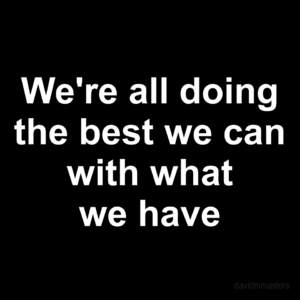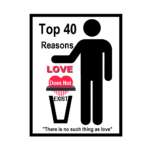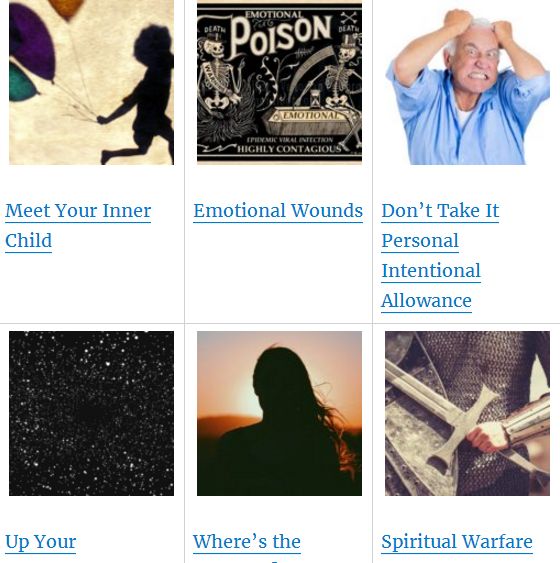When you see that person who is calm, in a state of zen, and nothing seems to bother them, you think, “What the hell is wrong with that person?”
What you might find, is that they have mastered the idea that nothing is personal. They don’t seem to get uptight (much) and stuff just seems to roll off their back, as they don’t get overanxious or take things personally. They embrace the idea that things are as they are and that’s okay.
You, too, could begin living a life free from the angst of others, because, after all, people will disagree with you, even scheme to trip you up, or try to make you look as if you’re overreacting in front of peers or coworkers, just to prove they can.
Rather than react, you could opt to stop taking things personally and take away their superpower in an instant.
First of all, make a list of the things that piss you off (you know the people that piss you off have this list, shouldn’t you?). Next, review the list. What do yo find? Look for the key components that bother you (this can be an exciting journey in self-discovery, as you find the things that irk you the most often are related to key life moments in your past – or early childhood – torturing you in the present).
Try to look at the issue from other perspectives and think about how a particular thing or topic that carries with it a powerful negative charge and ask, “Does it really matter?” In the scope of the life and times of the human race, many a mountain has been made of molehills, just to cause division between peoples, when in reality, very little is truly meaningful. And when you think of it, nothing has meaning, except for the meaning that you give it.
Take a look at celebrities, politicians and other public figures that take massive stands, expecting others to conform to their point of view. How is that working for them?
I discovered long ago, you are more likely to get someone to see from your perspective if you love and accept them just they way they are without expectation, rather than entering into a heated debate or brow-beating them.
If community or global issues get you riled up, realize whatever it is, is not happening to your, personally. Position yourself as a supporter instead of a protester. Protesters (those who expend a great deal of energy in opposition to something) actually add more energy to the thing they are standing against, strengthening the very thing they don’t want. On the other hand, supporters put their energies toward what they do want (the solution) thereby increasing its effectiveness.
Remember that life is what it is. It takes all kinds of people to make the world go ’round, and start making room in your psyches to allow others to be as they are. Take the position of the observer rather than the enforcer. It’s not your job to control others, so try to find opportunities to sit back, relax, and enjoy the show.
As you are growing into a more tolerant lifestyle, embracing who you are without having to have anyone conform to your personal standards, you may begin to see others doing the same thing. Finding opportunities to spend time in their proximity will make your allowance grow even more.
Does that mean life will be rosy? No, not really. You can wear all the rose-colored glasses you want, and still, people you trusted will fall short of the mark, those you love will hurt your feelings, and you will do likewise (either intentionally, or not). This is a fact of life. Do your best to realize that it is what it is, any tr not to judge others (or yourself) too harshly when it becomes apparent.
How can you disarm those who would like to attack you, or put you down?
Easy, don’t give them any ammunition. When you practice tolerance, there is no opposition. When you can wrap your head around that everything and everyone is perfectly fine just the way they are and no one is right or wrong, allowing for differing opinions, what is there to fight against? Nothing.
And what about your idea of truth? Do you find yourself being defensive, fighting for what you believe? Well, just sit back and think about it… Where did you get this idea of truth? Did someone plant the idea, or did it originate from within your own mind, with your own reasoning and rationale? Then review all the things you strongly believed in… Has your belief changed over time? In most cases, truth and what we believe does change over time, as new information becomes available. It’s inevitable. Things change. So cut yourself some slack and admit to yourself, “This is what I believe to be true at this moment in time.” Based on the information at hand. Who knows what you might believe tomorrow.
Have good intentions and hold yourself to the standard of the Hippocratic Oath, “to do no harm.”
Stop adding energy to the bad things that are brought to your attention. If you see something bad in the media, switch it off, change the channel, refuse to engage in it. Just the welling up of negative emotion within you makes those things that you dislike more powerful. Avoid all negativity.
When people are acting poorly, it is not up to you to try to change them, punish them, or make them feel bad. Do not talk about them behind their back or try to ridicule them for their actions, confront them or offer them advice.
If you find yourself in close proximity and a confrontation is unavoidable, try to speak your peace with lighthearted humor, remembering that it’s not about you. When someone is in opposition of you and you find yourself in an uncomfortable situation, keep in mind that this person is acting out because of their own inner demons. It has nothing to do with you. In fact, it can be somewhat of a blessing that you were chosen to participate, because the more tolerant, new you, is less likely to fight and more likely to understand and have empathy for the person who is acting out. Try to put yourself in their shoes.
If you don’t like haters, don’t be one. How hard is that? Only share positive support and do not put others down, not for anything. After all, aren’t we all just doing the best we can with what we have?
If yo have an opinion or want to share some factual data, please do so, but share your information humbly, without the expectation that anyone should believe you or conform to your thought patterns. Think of it more like planting seeds. Share your information and allow it to take root and grow on its own, or not.
Practice the Golden Rule (Jesus’ sermon on the mount, Matthew 7:12) by treating others as you would like to be treated.
Congratulations, you are on your way to the tolerant new you, who doesn’t take things personally, because it’s not. Everything and everyone just is as it is, and that’s okay.



























